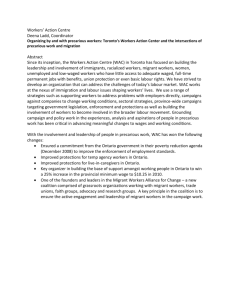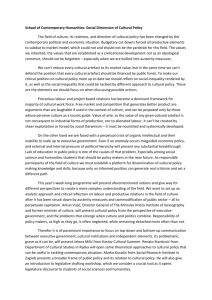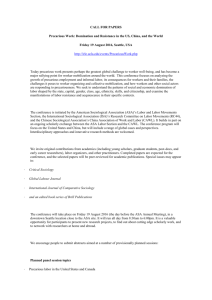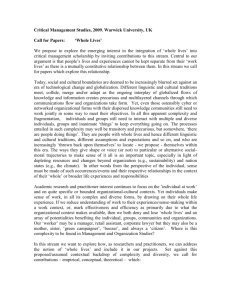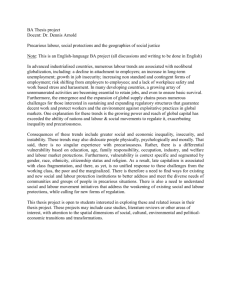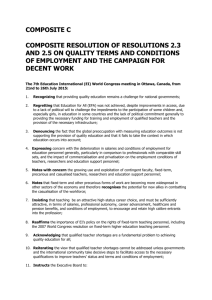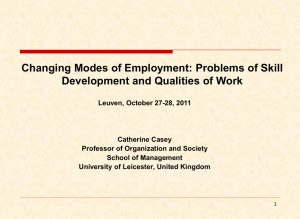FBT-06-XXX-ED
advertisement
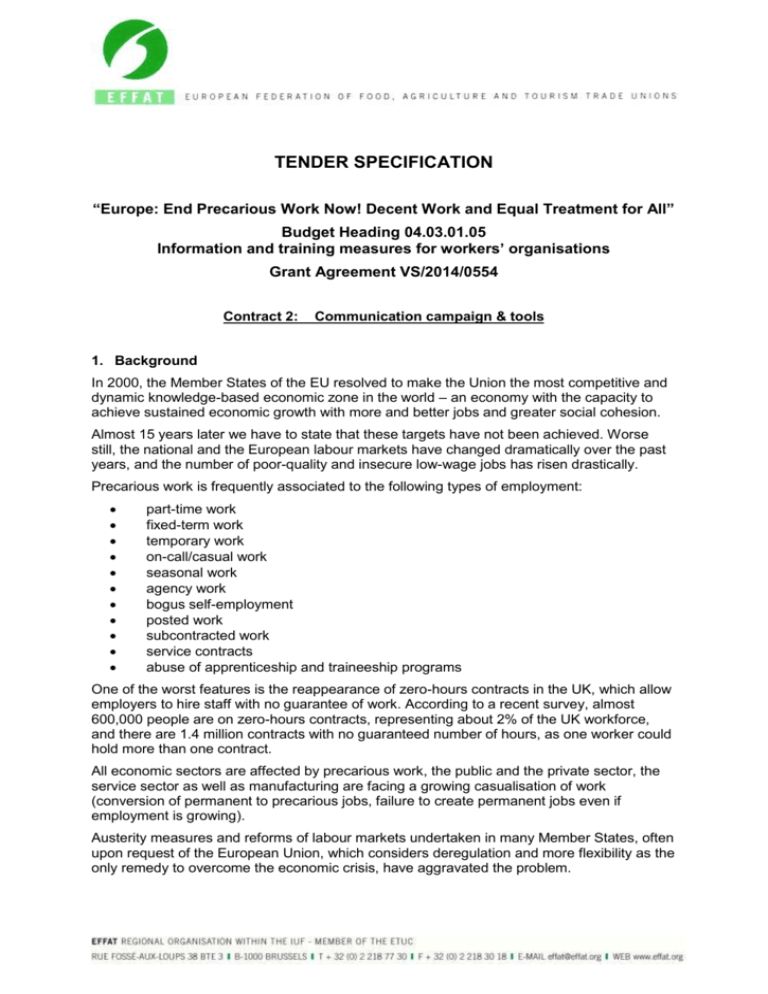
TENDER SPECIFICATION “Europe: End Precarious Work Now! Decent Work and Equal Treatment for All” Budget Heading 04.03.01.05 Information and training measures for workers’ organisations Grant Agreement VS/2014/0554 Contract 2: Communication campaign & tools 1. Background In 2000, the Member States of the EU resolved to make the Union the most competitive and dynamic knowledge-based economic zone in the world – an economy with the capacity to achieve sustained economic growth with more and better jobs and greater social cohesion. Almost 15 years later we have to state that these targets have not been achieved. Worse still, the national and the European labour markets have changed dramatically over the past years, and the number of poor-quality and insecure low-wage jobs has risen drastically. Precarious work is frequently associated to the following types of employment: part-time work fixed-term work temporary work on-call/casual work seasonal work agency work bogus self-employment posted work subcontracted work service contracts abuse of apprenticeship and traineeship programs One of the worst features is the reappearance of zero-hours contracts in the UK, which allow employers to hire staff with no guarantee of work. According to a recent survey, almost 600,000 people are on zero-hours contracts, representing about 2% of the UK workforce, and there are 1.4 million contracts with no guaranteed number of hours, as one worker could hold more than one contract. All economic sectors are affected by precarious work, the public and the private sector, the service sector as well as manufacturing are facing a growing casualisation of work (conversion of permanent to precarious jobs, failure to create permanent jobs even if employment is growing). Austerity measures and reforms of labour markets undertaken in many Member States, often upon request of the European Union, which considers deregulation and more flexibility as the only remedy to overcome the economic crisis, have aggravated the problem. Precarious work is generated by employers seeking to minimize labour costs and to shift the economic risks of their businesses onto their workforce. The specific elements contributing to precarious work are constantly in transformation, as employers always find new ways to do so. Precarious work generally implies: low and unsecured/irregular wages flexible terms and conditions of employment lack of protection against dismissal critical working conditions limited or no access to social protection schemes such as health care, pension contributions and unemployment insurance; absence or limited access to trade union rights absence of collective bargaining power lack of control over working hours low chances of promotion uncertainty about future employment limited or no access to education and vocational training Nevertheless, not all forms of non-standard work are automatically precarious, in certain periods of life or under specific personal circumstances workers might wish to temporarily abstain from full-time permanent work. However, non-standard work has to be considered as precarious, if it is not voluntary but imposed by the employer, and if the worker does not have the choice to go back to regular employment. Full-time, permanent work used to be the dominant form of employment relationship and still largely structures entitlements to social protection and welfare, therefore the significant growth of non-standard forms of employment relationships means that growing numbers of Europe’s workers are excluded from employment protection and welfare benefits. A precarious job often implies a precarious life, precarious relationships and therefore the impossibility to plan a conventional existence. A lack of job continuity does not allow workers to improve their skills, it therefore becomes even more difficult to obtain a secure job. Individuals in precarious work are more likely to be excluded from social rights, such as to decent housing, medical care, pensions and education, while exclusion from these social rights pushes individuals into precarious work. Work precariousness thus feeds into other situations that cement individuals into precarious lives. Precarious work also incurs the risk of individuals lacking adequate social protection in old age. Increasing precarious employment is one of the causes for the growing poverty in Europe. What is more, an extensive use of precarious work determines the progressive destruction of workers’ individual and collective rights, it undermines collective bargaining and it weakens trade union action. In all its forms, precarious work draws disproportionally on the most vulnerable groups of workers; it deepens poverty and insecurity, undermines solidarity and entrenches inequality. Precarious employment has also fostered segmented labour markets, which obstruct the movement of workers to more stable employment, particularly for vulnerable groups including migrants, women, young people and the disabled. More and more often, workers do the same job at the same location, but benefit from different wages and employment conditions. This seriously violates one of the fundamental values of the EU: the principle of equal treatment and non-discrimination. 2 But also employers may suffer from these developments, as companies which behave in a socially responsible way, provide their employees with secure jobs and respect all labour and social legislation often see their competitiveness jeopardised. Therefore, the fight against precarious work is also a contribution to strive for fair competition in the EU. A wide range of EU legislation and policies shape the framework for labour markets and employment policies, e.g. competition law, internal market principles, social legislation, public procurement legislation, company policies, smart regulation, immigration policies, etc. Social legislation is getting more and more fragmented, setting different rules for different categories of workers, e.g. part-time workers, fixed-term workers, temporary agency workers, posted workers, seasonal workers from third countries, intra-corporate transferred workers, etc., which opens the door for employers to “shop” for the cheapest workforce with the lowest standards of protection. EU programmes such as Smart Regulation, REFIT, etc., are also systematically reviewing EU labour and social legislation. Aiming at simplifying EU laws and reducing regulatory and administrative burdens for businesses, such programmes threaten to weaken the existing legislation and minimum standards on working & employment conditions, health & safety at the workplace, information & consultation of workers, which are a substantial part of the “acquis communitaires”. All this generally undermines the EUs task to improve the living and working conditions of the peoples of Europe and to strive for social progress and social cohesion (as stated in the Treaty on the Functioning of the EU). Trade unions in Europe have been closely monitoring the developments described above and they have constantly alerted of the impact they are having on labour markets and employment, and on the society as a whole. 2. Objectives of the project For many years, the European Trade Union Federations and the ETUC have been fighting against the growing precarisation of work. With this multi-sectoral project, the project partners want to build on the work undertaken so far by each of them and jointly elaborate a common strategy for decent work and equal treatment for all workers. With this common action, the European Trade Union Federations and the ETUC want to achieve the following key objectives: facilitate the internal discussion amongst EFFAT, EFBWW, EPSU, ETF, IndustriAll, UNI-Europa, ETUC and their national affiliates on how to join forces in the fight against precarious work raise awareness of the various forms of precarious work and the damaging impact of the growing casualisation of employment highlight the need for a harmonised Europe-wide framework of labour and social legislation with binding minimum standards for all, to avoid social dumping and unfair competition, and to ensure decent work and equal treatment for all workers come up with proposals for solutions: what needs to be done to close legal and administrative loopholes which facilitate the casualisation and precarisation of employment develop a common strategy for the implementation of the recommendations 3 elaborate a communication strategy to support the execution of the project and the dissemination of the results, including the necessary tools The project conforms to the objectives of the Budget Heading 04 03 01 05 - VP/2014/002, and particularly meets the following priorities: to address the employment and social dimensions of EU priorities relating to the recovery from the crisis, taking into account increasing inequalities within and between Member States to strengthen the capacity of workers' organisations to address, at EU/transnational level, changes in employment, modernisation of the labour market, quality of work, anti-discrimination, active inclusion and decent work The project will pay particular attention to vulnerable groups most severely hit by the growing number of precarious jobs, such as women, young people and migrants. 3. Purpose of the contract The purpose of the contract is to support the European Trade Union Federations and the ETUC in the execution of the project “Europe: End Precarious Work Now! Decent Work and Equal Treatment for All”, and more concretely, to elaborate a communication strategy and campaign tools for the dissemination of the results, to achieve the above mentioned objectives of the project. 4. Tasks to be performed by the Contractor The expert should provide the following services: - Elaboration of a communication strategy to give support to the execution of the project and the dissemination of the results - Production of an awareness raising video showing the various forms of precarious work and the damaging impact of the growing casualisation of employment, with testimonies of different categories of workers from various economic sectors and with examples of innovative approaches / successful practices to fight precarious work (exact content to be determined by PSC) - Design of flyers to facilitate the dissemination of the results of the project, e.g. the recommendations for changes in legislation, the action plan for implementation, common strategy for decent work and equal treatment for all - Elaborate slogans highlighting the demands of the project partners - Design of banners which can serve multiple use, e.g. conferences, demonstrations, etc. - Make all tools applicable to multi-platform use, e.g. websites, YouTube, social media, apps. The communication strategy and the supporting tools shall be elaborated based on the findings of the research by another expert, the input of the Project Steering Committee and the discussions at the intermediary conference. 4 In addition to the above mentioned tasks, the external expert would have to carry out the following tasks: - Presentation of the progress in the work to the Project Steering Committee - Presentation of the strategy and the tools at the intermediary and final conferences The work of the Contractor will be advised by a Project Steering Committee composed by representatives of the project partners. 5. Expertise required Candidates should meet the following requirements: - Experience with elaborating communication strategies, PR campaigns and dissemination tools in an international / European context Experience with the design of flyers, banners, Apps, social media presence Experience with the production of short films / videos with voice-over and / or subtitles in several languages In-depth know-how of the professional use of social media Familiarity with European and national trade union structures Familiarity with international, European and national labour legislation, industrial relations and social dialogue Excellent communication skills in English, other European languages are an asset 6. Time schedule The duration of the Grant Agreement is 18 months: 1 December 2014 – 1 June 2016. This contract will start immediately after the awarding of the contract and end with the accomplishment of all tasks. Meetings are planned as follows (exact dates tbc): Project Steering Committee Intermediary conference Final conference June 2015, January and April 2016 October 2015 February 2016 7. Payment The maximum budget available is € 27,000 (incl. VAT). Travel and accommodation will be covered by the grant agreement and reimbursed by EFFAT upon justification. The Contractor will receive an advance and a final payment. 8. Legal obligations Basis of the contract is the grant agreement between the European Commission and EFFAT. The terms of this grant agreement are also applicable to the Contractor. 5 9. Selection criteria The selection criteria are: verifiable expertise and references, price not exceeding the amount stated in the grant agreement. 10. Award Criteria The contract will be awarded to the tenderer whose offer represents the best value for money, taking into account the following criteria: - Capacity to understand and achieve the objectives of the project Quality and coherence of the proposed methodology Proof of compliance with required expertise and qualifications in the field of communication, campaigns, tools, etc. (please attach references) Ability to deliver within project deadlines and budgetary limits The respect of the principles of transparency and equal treatment with a view to avoiding any conflict of interest will be undertaken. 11. Content and presentation of the bids The bid should include: - Methodology Time table for the execution of the contract and the number of performance days CV(s) and references demonstrating the expertise and the experience of the tenderer Information on the sub-contractor's previous experience of similar work Daily fee (VAT excluded and VAT included, indicating the applicable VAT rate) and the total price of the bid Complete contact details and bank details and a proof of the professional registration of the tenderer (VAT number, enterprise number) The bid must be presented in English. Offers must be received by 2 March 2015 at the latest. All candidates must deliver their bid by registered mail and by e-mail to: Kerstin HOWALD EFFAT Rue Fossé aux Loups 38 1000 Bruxelles Belgium E-mail: k.howald@effat.org Brussels, 30 January 2015 6
